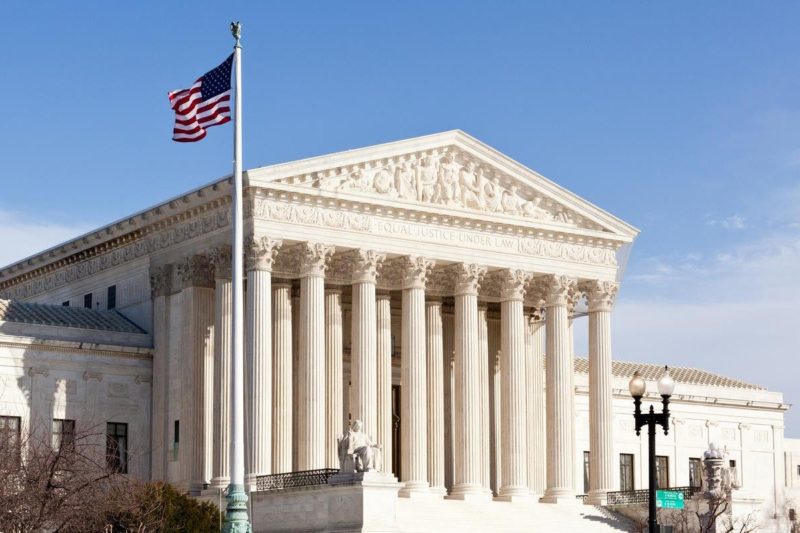Supreme Court Won’t Hear Arkansas Case Challenging ‘Roe’
The Supreme Court refused to hear a case arguing whether an Arkansas law banning abortion at 12 weeks, with narrow exception, should be considered constitutional.

The U.S. Supreme Court on Tuesday turned away a request by anti-choice lawmakers to review an Arkansas law that bans abortion at 12 weeks of pregnancy with narrow exceptions, letting stand an appellate court ruling striking the measure as unconstitutional.
Arkansas’ SB 134, known as the “Arkansas Heartbeat Protection Act,” outlaws abortion when a fetal heartbeat has been detected—which can be as early as six weeks’ gestation—and at 12 weeks, with narrow exceptions for the life of the pregnant person, cases of rape or incest, and those that involve a “lethal fetal disorder.”
The law, considered to be among the most radically restrictive in the nation, has been blocked by a federal judge since March 2014. Attorneys for the state urged the Roberts Court to take the case anyway, arguing the time was right for the Court to review the “rigid” viability framework put in place by Roe v. Wade and Planned Parenthood v. Casey that prevents states from banning abortions prior to fetal viability.
The Roberts Court declined in a one-line order, giving no explanation for its decision.
“Arkansas politicians cannot pick and choose which parts of the Constitution they want to uphold,” Nancy Northup, president and CEO of the Center for Reproductive Rights, said in a statement following the order. “The Supreme Court has never wavered in affirming that every woman has a right to safely and legally end a pregnancy in the U.S—and this extreme abortion ban was a direct affront to that right.”
Attorneys defending Arkansas’ measure had urged the federal courts to rethink Roe v. Wade, the landmark Supreme Court decision legalizing abortion, as well as Planned Parenthood v. Casey, the decision that reaffirmed that abortion is a fundamental constitutional right. In arguing for the courts to grant states the power to re-criminalize abortion, attorneys for Arkansas argued the fact that women could turn over any unwanted births to the state under its Safe Haven law without criminal prosecution for abandonment removed the burden of unwanted pregnancy and thus any need for courts to recognize a constitutional right to abortion.
“Accordingly, even if abortions were prohibited in Arkansas, no pregnant woman would be forced to endure the burdens of ‘additional offspring’ and ‘a distressful life and future[,]’ or mental and physical health ‘taxed by child care[,]’ or general distress associated with an ‘unwanted child,’ or ‘the problem of bringing a child into a family already unable, psychologically and otherwise, to care for it,'” attorneys for the State argued. “The safe haven statute completely eliminates the pregnant woman’s burden of parenthood.”
“Arkansas cannot veto a woman’s decision to have an abortion, period,” Talcott Camp, deputy director of the ACLU Reproductive Freedom Project, said in a statement. “This personal, medical decision rests with a woman, her family, and her doctor—not politicians. We are gratified but unsurprised that the Court found nothing worthy of their review in this case.”
Arkansas’ SB 134 is not the only pre-viability ban before the Roberts Court this term. The justices on Friday will consider a request from anti-choice lawmakers in North Dakota to review a decision from the Eighth Circuit Court of Appeals striking as unconstitutional a North Dakota law that bans abortion as early as six weeks. So far the Court has repeatedly turned away any request by anti-abortion lawmakers to revisit the viability rule, including letting stand in 2013 a federal appeals court decision permanently blocking an Arizona law that banned abortions at 20 weeks.
Tuesday’s order turning away Arkansas’ 12-week ban comes about two months after the Supreme Court agreed to review portions of Texas’ HB2, an anti-choice law that places certain architectural and licensure requirements on abortion clinics and doctors. Advocates claim HB2 is responsible for closing half of the abortion clinics in the state and if upheld by the Roberts Court this summer, would leave the nation’s second largest state with ten or fewer abortion clinics.
